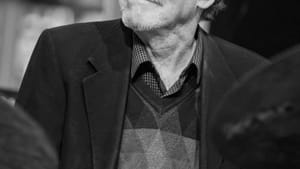Stay in the Loop
BSR publishes on a weekly schedule, with an email newsletter every Wednesday and Thursday morning. There’s no paywall, and subscribing is always free.
Legendary listening
Remembering Philadelphia jazz drummer, composer, and advocate Jim Miller

I first met Jim Miller in the early 1980s when I needed a drummer to fill in for my regular guy on short notice. From the first downbeat, I realized this musician had a way of transforming the drums behind a singer: from a ballad’s whispering pulse, delicate and lush, to launching an insistent pocket with the band, allowing me to glide above the groove, suspending or parsing my notes in midair.
At first break that first night, Miller told me he was born in Indianapolis and had moved to Philly in 1977 after stopping here for a gig with a touring band. The hotel room’s radio, tuned to an All-Coltrane Weekend on WRTI, sold him on our city.
Tuning in to everyone
Miller was already known as the cofounder of the jazz-fusion group Reverie, an experimental group that included keyboardist Mark Knox, bassist Gerald Veasley, and saxophonist EJ Yellin; and featured many guest artists, including guitarist Jef Lee Johnson. A fan favorite, Reverie played festivals, clubs, and colleges from New England to Florida. Of course, I didn’t know any of this when I met Miller, but I knew that he would be my first call from now on. Now, after forty years of collaborations, I’d never heard a drummer like him.
Veasley, president of Jazz Philadelphia, says Jim taught him that “listening is the most essential skill for a musician," adding, "I never played with a drummer who was so tuned to the musicians around him. He was just as tuned into people off the stage. His heart was as big as his musical ears.”
Philly embraced him as a musician, and Miller was a highly sought drummer, recording and playing with many nationally known artists, including Philly greats like Johnny Coles, John Blake Jr., Al Grey, Reggie Workman, Larry McKenna, Richie Cole, Charles Fambrough, Randy Brecker, Buddy DeFranco, and Tyrone Brown. Miller regularly played and recorded with small groups led by singer Evelyn Simms, fusion-pioneer pianist Eddie Green, and baritone saxophonist Denis DiBlasio.
Drummer Tom Cohen, a fellow traveler with Miller in Philly drum circles (they frequently subbed for each other), tells me that “Jim created a modern style that was uniquely his own. Born of deep passion and a deft touch, he served up a gritty matrix of hipness that was singular … the mark of a true jazz musician.”
Beyond the drums
In 1986, angry and indignant at the indifference of the world toward jazz and the people who played it, Miller founded a cooperative record label, which eventually became Dreambox Media, to spotlight Philadelphia-area jazz artists deserving recognition that major labels consistently overlooked. I became the second artist on the label (Reverie was the first), and we both spread the word to the community at large: Yes, you can record, get airplay, and sell your work in addition to sticking it to the big labels! We built it and they came.
In 1999, Dreambox Media won Philadelphia Magazine's Best of Philly award for Jazz Record Label, and in early 2007 the label celebrated its 20th anniversary, coinciding with its 100th release. In 2010, Jim’s MONKadelphia Crepuscule CD was named one of the Top Ten Best in Jazz by the Inquirer. So many artists’ original work from this region was documented from 1986 through 2015, and Philly is lucky to have this treasure trove of jazz history to appreciate and listen to well into the future. Jim Miller did that. But he wasn’t finished.
Jazz Bridge, a charity to help professional jazz and blues artists in crisis, was created by musicians who knew firsthand that choosing a life in jazz, essentially a vow of poverty, often ends in tragedy. Miller immediately got involved to help get the organization off the ground (I was its founder and first executive director). As a volunteer and board member, Miller made sure a guitarist with a cognitive disability made it to Horizon House for his appointments. He drafted fellow musicians to jam with an avant-garde drummer in hospice. Miller lugged PA equipment and drum sets for elderly musicians, learned QuickBooks, played every fundraiser for free, and basically did anything and everything to make Jazz Bridge a success. He knew how hard the life was, because he lived it every single day.
A jazz hero
Miller loved the drums, and his book, A Brief History of Time-Keeping: From Baby Dodds to Jack DeJohnette, showed his wry sense of humor and keen intelligence from the start. He dedicated the book to his mother (who made him play for “every disinterested relative or family friend who happened to come by”) and wrote that “those early days subliminally prepared me for the indifference and implied hostility I would recognize in many an American jazz-club audience later in my career.”
Eventually, he formed his own band, Miller Time, which put out three CDs of original material (much of it political), and two of his compositions will be featured in the Real Philadelphia Book, a compendium of Philly jazz and blues artists’ original compositions, coming soon from Temple University Press. This was Miller’s last project—he was working intensely on it as an editor when he died.
Singer Wendy Simon, a cofounder of Jazz Bridge, says, “He was smart, funny, a creative and compassionate person who believed in social justice. I was blown away by his musical, out-of-the-box compositions.”
For the entirety of his work, Miller received the Jazz Hero Award for the Philadelphia region by the Jazz Journalists Association in April 2013.
I loved his presence in my own life, and the Philadelphia jazz community lost a champion on February 25, 2019, when Miller died of sepsis at the University of Pennsylvania Hospital. He was only 65 and leaves behind his wife Michelle, daughter Annie, many students, and a host of admirers inspired by his empathy and advocacy.
Wherever jazz lived in this city, Jim Miller was there, too. This town will never be the same.
Donations in his name can be made to Jazz Bridge.
Sign up for our newsletter
All of the week's new articles, all in one place. Sign up for the free weekly BSR newsletters, and don't miss a conversation.

 Suzanne Cloud
Suzanne Cloud